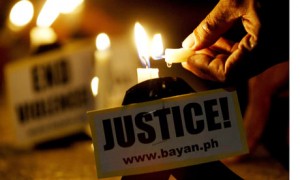
The death toll from a massacre in the southern Philippines rose to 57 today after police found another 11 bodies in the country’s most horrific incident of election violence. Not all the bodies have been identified, but 22 of the victims are believed to be journalists, making Monday’s attack the deadliest ever on the media anywhere in the world.
Thirty-three of the victims were men and 24 were women, police said. As the full extent of the carnage emerges, domestic and international pressure is growing on President Gloria Macapagal-Arroyo to punish those responsible for what the UN secretary general, Ban Ki-moon, called a “heinous crime”.
In her first comments on the killings in Maguindanao province, Arroyo, who has declared a state of emergency in the two southern provinces, promised justice for the victims and declared a national day of mourning. “This is a supreme act of inhumanity that is a blight on our nation,” she said in a statement. “The perpetrators will not escape justice. The law will hunt them until they are caught.”
The dead included the family of Ismael Mangudadatu, who planned to challenge a member of a rival political clan for the governor’s office. Mangudadatu, after receiving death threats, sent his wife and relatives to file his candidacy papers for elections taking place next year. Mangudadatu believed that the presence of women and numerous journalists would ensure the safety of the convoy. But it was stopped by about 100 armed men, who herded them on to a remote hillside and attacked them with M-16 rifles and machetes.
Some of the women were reportedly raped before they were killed. Two of their vans and many bodies were thrown into a freshly dug pit and covered with earth by an excavator. A Reuters photographer at the scene said the vehicles were buried with dead men at the wheel. Mangudadatu said four witnesses in his protection, whom he refused to identify, told him the convoy was stopped by dozens of gunmen loyal to the powerful Ampatuan clan.
Police said they were investigating reports that a member of the Ampatuan clan, four police commanders, including the provincial police chief, and dozens of police and pro-government militiamen were among the gunmen who blocked the convoy. The national police chief, Jesus Versoza, said the four commanders had been relieved of their duties and confined to camp while being investigated. The army has disbanded a 200-member paramilitary force under the control of local officials and sent an extra 500 soldiers from a central island in the Philippines to reduce tension.
Suspicion has fallen on the Ampatuans because of the fierce rivalry between the Mangudadatu and Ampatuan families. Local media reports say the governor of Maguindanao, Andal Ampatuan, wanted his son, Andal Ampatuan Jr, the mayor of Datu Unsay, to succeed him next year. Investigators have said they will look at allegations that some members of the paramilitary force participated in the killings. Human Rights Watch in New York urged the government to start a fully independent investigation led by the national bureau of investigation, given allegations of involvement by members of the security forces and local militias.
“Far too many people have been gunned down in the Philippines while President Arroyo has sat on her hands,” said Elaine Pearson, deputy Asia director at Human Rights Watch. “The possible involvement of state forces in the Maguindanao massacre means that security personnel shouldn’t be allowed to interfere in an independent investigation.” But human rights officials voiced fears that the Philippine government would pull its punches in any investigation because the Ampatuans have helped deliver votes for Arroyo in past elections.
“I have run out of words to describe this. It’s ignominious, bestial,” Leila de Lima, the chair of the independent commission on human rights, told the Associated Press. She said there was “strong circumstantial evidence” implicating the Ampatuans. “I am sure the president must be agonising now,” she said, “but it’s a great test of political will, how far the national authorities can go in terms of swift and decisive action. Anything less than that, well, people would be able to put them to task.”
In an indication of how hard it will be for investigators, the justice secretary, Agnes Devanadera, admitted that the massacre had produced a chilling effect on provincial government prosecutors who fear that they might suffer the same fate as the victims. “The prosecutors in Maguindanao cannot move because they are scared. Because of the many deaths, they do not want to return there. So we got prosecutors who are not from Maguindanao,” Devanadera said, according to local media.